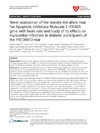Identificador persistente para citar o vincular este elemento:
https://accedacris.ulpgc.es/jspui/handle/10553/44651
| Título: | Novel association of the obesity risk-allele near Fas Apoptotic Inhibitory Molecule 2 (FAIM2) gene with heart rate and study of its effects on myocardial infarction in diabetic participants of the PREDIMED trial | Autores/as: | Corella, Dolores Sorlí, Jose V. González, José I. Ortega, Carolina Fitó, Montserrat Bulló, Monica Martínez-González, Miguel A. Ros, Emilio Arós, Fernando Lapetra, José Gómez-Gracia, Enrique Serra-Majem, Lluís Ruiz-Gutierrez, Valentina Fiol, Miquel Coltell, Oscar Vinyoles, Ernest Pintó, Xavier Martí, Amelia Saiz, Carmen Ordovás, José M. Estruch, Ramón |
Clasificación UNESCO: | 3206 Ciencias de la nutrición | Palabras clave: | Body-Mass Index Genome-Wide Association Coronary-Artery-Disease Cardiovascular-Disease Mediterranean Diet, et al. |
Fecha de publicación: | 2014 | Proyectos: | Preparacion de la Guia Para la Reduccion de los Desperdicios Alimentarios-Documento Ciber Obn, Fin y Nsf Red Alimentación Saludable en la Prevención Primaria de Enfermedades Crónicas: la Red Predimed. (Retics 2006) |
Publicación seriada: | Cardiovascular Diabetology | Resumen: | Background: The Fas apoptotic pathway has been implicated in type 2 diabetes and cardiovascular disease. Although a polymorphism (rs7138803; G > A) near the Fas apoptotic inhibitory molecule 2 (FAIM2) locus has been related to obesity, its association with other cardiovascular risk factors and disease remains uncertain.Methods: We analyzed the association between the FAIM2-rs7138803 polymorphism and obesity, blood pressure and heart rate in 7,161 participants (48.3% with type 2 diabetes) in the PREDIMED study at baseline. We also explored gene-diet interactions with adherence to the Mediterranean diet (MedDiet) and examined the effects of the polymorphism on cardiovascular disease incidence per diabetes status after a median 4.8-year dietary intervention (MedDiet versus control group) follow-up.Results: We replicated the association between the FAIM2-rs7138803 polymorphism and greater obesity risk (OR: 1.08; 95% CI: 1.01-1.16; P = 0.011; per-A allele). Moreover, we detected novel associations of this polymorphism with higher diastolic blood pressure (DBP) and heart rate at baseline (B = 1.07; 95% CI: 0.97-1.28 bmp in AA vs G-carriers for the whole population), that remained statistically significant even after adjustment for body mass index (P = 0.012) and correction for multiple comparisons. This association was greater and statistically significant in type-2 diabetic subjects (B = 1.44: 95% CI: 0.23-2.56 bmp; P = 0.010 for AA versus G-carriers). Likewise, these findings were also observed longitudinally over 5-year follow-up. Nevertheless, we found no statistically significant gene-diet interactions with MedDiet for this trait. On analyzing myocardial infarction risk, we detected a nominally significant (P = 0.041) association in type-2 diabetic subjects (HR: 1.86; 95% CI: 1.03-3.37 for AA versus G-carriers), although this association did not remain statistically significant following correction for multiple comparisons.Conclusions: We confirmed the FAIM2-rs7138803 relationship with obesity and identified novel and consistent associations with heart rate in particular in type 2 diabetic subjects. Furthermore, our results suggest a possible association of this polymorphism with higher myocardial infarction risk in type-2 diabetic subjects, although this result needs to be replicated as it could represent a false positive. | URI: | https://accedacris.ulpgc.es/handle/10553/44651 | ISSN: | 1475-2840 | DOI: | 10.1186/1475-2840-13-5 | Fuente: | Cardiovascular Diabetology [EISSN 1475-2840], v. 13, article number 5, (Enero 2014) |
| Colección: | Artículos |
Citas SCOPUSTM
12
actualizado el 08-jun-2025
Citas de WEB OF SCIENCETM
Citations
11
actualizado el 22-feb-2026
Visitas
247
actualizado el 15-ene-2026
Descargas
117
actualizado el 15-ene-2026
Google ScholarTM
Verifica
Altmetric
Comparte
Exporta metadatos
Los elementos en ULPGC accedaCRIS están protegidos por derechos de autor con todos los derechos reservados, a menos que se indique lo contrario.
